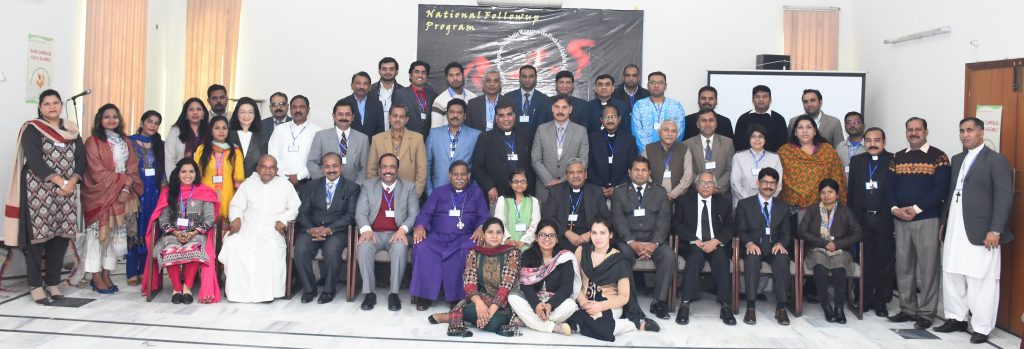Asia Mission Conference follow-up consultation in Pakistan

“Churches and leaders should move away from a culture of “self-centeredness” to the “other centeredness” in order to be meaningfully engaged in prophetic witness to the truth and light”, affirmed representatives of the Pakistan churches gathered to discuss on the theme of the Asia Mission Conference (AMC) held in Yangon, Myanmar in October last year .
Organized by the Christian Conference of Asia (CCA) and hosted by the National Council of Churches in the Pakistan (NCCP) as a follow-up of the AMC, the Consultation was held at the headquarters of the NCCP in Lahore, Pakistan.
The national Consultation was attended by 60 participants from various member churches of NCCP and CCA in Pakistan.
Most of the 29 Pakistan church representatives invited to attend the AMC held in Myanmar were denied of Visas to Myanmar.
In the opening address of the Consultation, Rev. Azhar Mushtaq, of the Church of Pakistan, stressed the importance of responding to the urgent call to churches in Pakistan to witness to the truth and light amidst dark realities and to follow Jesus Christ who transforms the world.
In a thematic presentation on Prophetic Witness to the truth and light, Fr. Emmanuel Assis emphasized on “necessity of listening while being engaged in prophetic witness”.
“Today we are used to speak much. May be people are affected by noise pollution. Whatever happens in our surroundings, it is important to listen, and listening leads us to respond to the mission of prophetic witness. Listening is the first process to respond and participate in the prophetic witnessing.” Fr. Emmanuel Assis of the Roman Catholic church said.
Bishop Humphrey Peters, moderator of the Church of Pakistan, in his address on “Challenges to Prophetic Witness of the Churches in Pakistan to the Truth and Light” shared the real challenges from the day today experiences and stories of struggles from Pakistan. He added that the stark realities of religious intolerance warrant the followers of Jesus Christ to be witnesses in the midst of challenges.
“Territorial Commander Iver Telfer of the Salvation Army challenged the participants in his presentation on “Accompanying the People and Communities in Pakistan”, and said, “the churches in Pakistan have massive resources in the church, and we need to enable the people to achieve their God-given potential.”
Dr. Majid Abel of the Presbyterian Church of Pakistan stated that Churches in Pakistan should come forward to perform “their role to participate in the Reign of God”.
Bishop Irfan Jamil of Church of Pakistan Lahore Diocese reminded the participants to fulfill the need of servanthood as a priority in Christian life and witness.
“We need five components in fulfilling our servanthood; first, proclaim the gospel boldly; second continue to develop the discipleship which should be our ongoing process in the church life; third have compassion on the people in need with action; fourth, keep your transforming spirit; fifth, remember our stewardship on God’s creation; this works only when we empty ourselves (kenosis) trusting the power of Holy Spirit who moves us into action,” added Bishop Irfan Jamil.
“Although the fundamental religious movements are becoming stronger and religious intolerance continue to threaten the minority Christians in Pakistan, it is more effective to seek a way to live in harmony with other faiths rather than accusing each other,” Said Dr.Farhana Nazir, a woman theologian in Pakistan.
“The Consultation provided the participants a platform to articulate the emerging missiological concerns in Pakistan context and it was a very significant gathering of church leaders to affirm their unity and to reconfirm their commitment to be part of God’s mission”, stated Victor Azariah, the General Secretary of the NCCP.
CCA staff members Rev. Jung Eun Moon Grace and Sunila Ammar coordinated and facilitated the Consultation.
CCA’s Diamond Jubilee celebration in Pakistan
The participants of the national consultation together with a group of specially invited guests attended a special commemorative Diamond Jubilee celebration of CCA organized by the NCCP and CCA member churches.
Bishop Azad Marshal, President of NCC Pakistan reflected that “CCA was founded to be the voice of the churches in Asia, and during the past six decades CCA accompanied the Asian churches in various ways. The churches in Pakistan benefited in various ways through accompaniment of CCA and other Asian churches.










